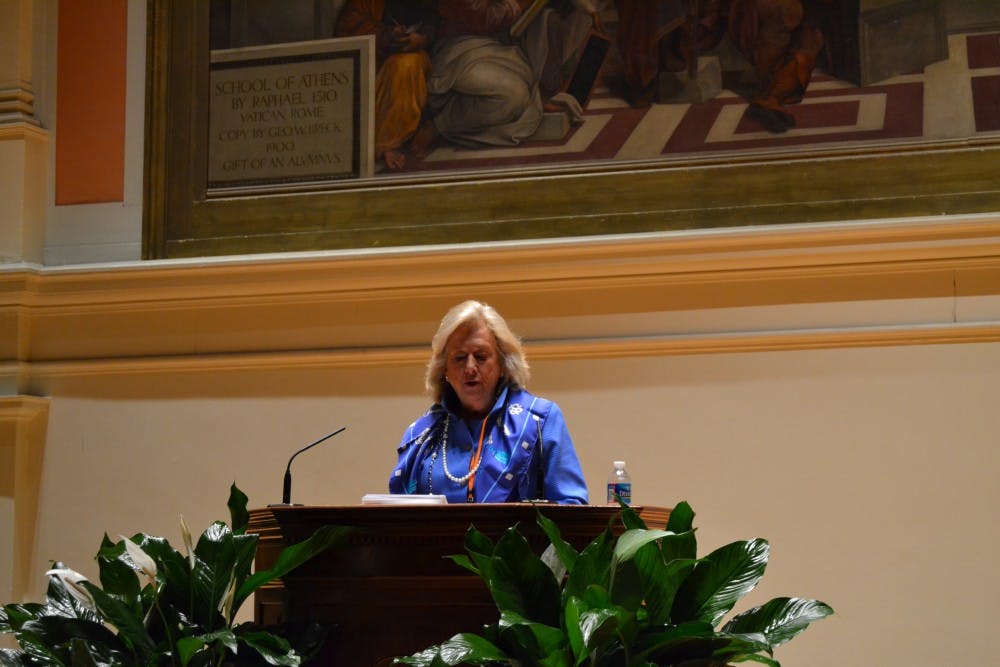The second and final session of the University’s national “Dialogue at UVa: Sexual Misconduct Among College Students” conference was held on Grounds Tuesday.
The session began with a keynote address by Salamishah Tillet, a rape survivor, scholar and professor at the University of Pennsylvania who seeks to champion the rights and voices of vulnerable citizens.
Following the address was a panel discussion on the complexities of adjudication.
Panel guests included Linda Fairstein, a lawyer, former prosecutor, best-selling crime novelist and leading expert on crimes of violence against women and children; Gina Smith, a lawyer specializing in advising college campuses on the process of adjudication; and moderator Anne Coughlin, a University law professor.
Coughlin opened by addressing the legal complexities of settling a sexual misconduct dispute. There are two different systems for adjudicating these offenses: one in criminal justice and another in campus misconduct.
The criminal justice system requires proof beyond a reasonable doubt in order to convict a sexual offender, while the college adjudication system requires only a preponderance of evidence. Fairstein and Smith agreed that differing requirements for the burden of proof in these two systems is acceptable because each institution serves it’s own distinct purpose.
In criminal court, where a conviction results in loss of personal liberty, Fairstein argued proof beyond a reasonable doubt is a justifiable standard, and that universities and law enforcement officials need to work in tandem to adequately handle cases of sexual misconduct.
“In the campus context we’re eliminating, preventing and addressing sexual harassment and sexual violence to make sure it doesn’t interfere with one’s educational experience,” Smith said. “Coordination with law enforcement is key.”
The panel also discussed the role a victim should play in the courtroom process. Fairstein said the process of revealing and reliving personal trauma leaves many women hesitant to come forward and follow through with the adjudication process.
“Once power and control was taken away through [the] event we don’t want to continually re-victimize the individual who already experienced something negative,” Smith said.
Somewhere between 2 and 8 percent of sexual misconduct cases are falsely reported, Smith said.
“There is nothing harder for an advocate or a survivor whose heart and soul is devoted to this issue to hear then that false reports do exist,” Fernstein said. “It’s pernicious because it hurts every legitimate survivor of sexual assault.”
Smith stressed separating the role of adjudicator and supporter.
“If we acknowledge the impact of trauma in dynamics in this issue, one practical thing we can think about in the campus setting is separation of roles, resources and reporting options,” Smith said.
University President Teresa Sullivan presented closing remarks to the conference.
“The issue is complex and I think we explored the complexity,” she said. “Complexity is a reason for better analysis, not an excuse for polarity. [We need to] educate constituencies for prevention because our graduates will be the legislators, judges, prosecutors and jurors of the future. If we can change our students, we can change the world.”
Sullivan said the conference laid the groundwork for applying a multidisciplinary lens to the issue of sexual misconduct, and highlighted the need for universities to improve internal and external communications in dealing with the problem.
“We learned that although administration can set an institutional tone, students need to talk to each other,” she said. “We need to make the conversation about sexual assault an integral part of the student experience.”
Sullivan concluded by stressing the importance of bystander intervention.
“Freedom from assault is a human rights issue and stopping assault is a moral obligation,” she said. “It belongs to all of us and it will take all of us working together to develop solutions to bring about real change on our campuses and across the country.”
The next conference on sexual misconduct will be held from July 13 to July 17 at Dartmouth College in Hanover, N.H.







